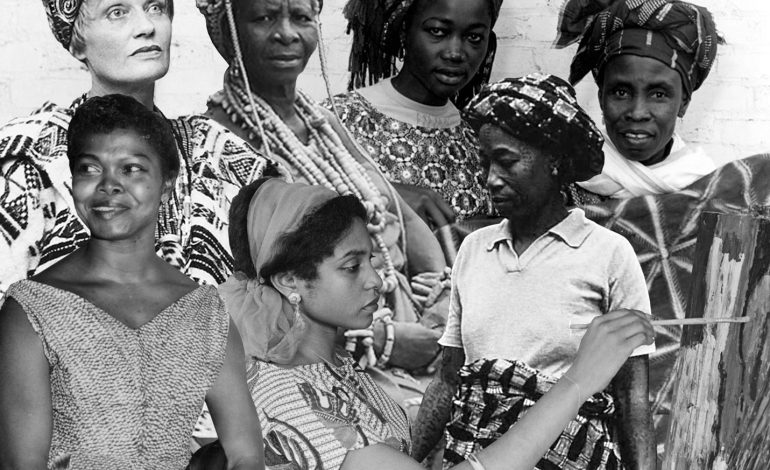My writing is my voice, it allows me to explore and understand and question, says Dare

Although Abi Dare lives in faraway UK, she has written a book in a unique kind of pidgin that is irresistible, The Girl with the Louding Voice, which is in the last three for The Nigeria Prize for Literature 2021. In this interview with AnoteArtHub, Dare gives flesh to her creative voice that resonates in this novel
Your book portrays the plight of the girl-child. Do you think society is unfair to the girl-child? Any hope out of this?
In many parts of the world, the girl child is at a disadvantage and is often marginalized. Nigeria is no exception. There is a common misplaced belief that the woman’s place is either in the kitchen or in the bedroom. As a deeply patriarchal society, where there has historically been a lack of provision of adequate education and skills acquisition programmes for the woman, starting from when she is a girl through to adulthood, I find that a woman struggles to become all that she wants. She ends up being wholly dependent on her husband or father or brothers and her choices and dreams are thus relegated. Educating the girl child has untold advantages but once this opportunity is denied, or reduced, the woman and the world around her suffers and it was important for me to highlight this in the exploration of Adunni’s journey. In a society (Adunni’s village in this instance) where poverty is rife, the girl child can be used as a commodity and her dreams are often silenced. The girl child must be given the opportunity to make choices about the direction of her life and her dreams. Having an education is the first step, the foundation to making her dreams reality.
You gave Adunni a very loud voice, but she needed other women to make her voice heard. In everyday life, are women as supportive of others as Adunni gets, since one often hears that women are their own worst enemies?
I’d like to say that I planned her voice- and that I had an idea of exactly how she would sound like, and what she would say, but Adunni’s voice came to me in a moment following a period of slight desperation. I was due to visit my supervisor for a consultation to discuss my MA dissertation submission. And while I had decided to write a book about a housemaid who lived in rural Nigeria, I had no clue of how to form my ideas and research into a story that was worth telling. I also needed to send him 3000 words of my work in progress as a basis for any conversation.
The evening before my deadline, in a state of utter panic, I sat down in front of my laptop and wondered what she would say, what she would sound like- and then, I heard it. Her voice. The first line of the book dropped into my spirit- and that was it. I grabbed it and never let go. The rest of the book built upon that foundation and evolved from an infusion of a number of sources: Nigerian slang, words from my then two-year-old who was just discovering how to speak, literal translations from Yoruba into English. I also drew inspiration from the very many housemaids I and my friends and family encountered over the years, from listening to interviews and watching Nigerian movies, from reading excellent books such as The Colour Purple that had been written in non-standard English.
Adunni needed to have a sense of humor and intelligence to balance out the heavy themes the book addresses – and I’d like to think that she demanded for it to be this way. I discovered a lot about her as I wrote. She felt like a living, breathing character who was sitting in front of me as I wrote, arms crossed, deep frown on her face or sometimes laughter, demanding what would happen to her and how she would react. Sometimes I felt her subtly chastising me for writing her reaction in a different way and I’d rewrite a scene until I felt that she was satisfied. I’d like to think that I simply followed her directions through. In many ways, she was and still is, a force unto herself.

In what ways can girls, who like Adunni are still trapped, escape her sort of tragic circumstance?
While there has been an increase in the report of abuse of girls like Adunni on the news and where organizations like NAPTIP exist, there is still so much more that can be done. The abolition of child marriage, for instance, needs to be enforced in every state in Nigeria. Law has to be enforced and repercussions are severe for breaking the law. Once policymakers are able to make changes in the law and where there is enforcement and impunity is expunged, then there will be positive changes. Until then, girls like Adunni face a bleak future unless we speak up and demand change.
You are in the last three. How anxious are you in view of the oppositions you face?
I am thankful and grateful first to God for the opportunity and to The Nigeria Prize for Literature committee and judges for the honor of the shortlisting. As is the nature of all competitions, there will be only one winner and so instead of fueling anxiety with possible outcomes which I have no control over, I focus instead on celebrating the fact that The Girl with the Louding Voice is being recognised, that NLNG continues to recognise and support the immense power of literature.
Why do you write?
I tell stories because it gives me purpose, a meaning to this journey of life. My writing is my voice, which allows me to say and explore and understand and question.It is an absolutely delightful, therapeutic, life affirming process.
What would you say writing has done for you and what do you hope that writing still would do for you?
Winning the prize would be wonderful, a great honor, and a true testament to the fact that stories that make a difference, that advocate for lives, for a meaningful wellbeing, that were written in an unconventional way can and should matter.
What do you hope to do with the USD$100,000 money that comes with the prize?
With the money, I hope to be able to continue to support charitable organisations that advance the cause of the girl-child.
What vision of society is espoused in your current work?
I hope the women in the story form a nuanced view of the world we live in. There are women who bring each other down and women who lift each other up. In Adunni’s case, she gets a unique opportunity to experience both aspects. I was deliberate in ensuring that the support, mentorship, and allyship that women give each other is more pronounced and seen as that which happens, as we don’t hear of it enough.
Who and what are your influences?
I love and respect the writings of Toni Morrison, Khaled Hosseini, Chigozie Obioma, Anthony Doerr, Ayobami Adebayo and so many others. I am always influenced by the book I am reading at the moment, as long as it engages me and is well written.
How much would you say The Nigeria Prize for Literature has energised writing in the country?
The Nigeria Prize for Literature, sponsored by NLNG, is a wonderful opportunity for literature in all its forms and manifestations to be celebrated, encouraged, and embraced, particularly in a world where there is a dearth of the appreciation of good literature, where so many other forms of media compete in a cluttered landscape. The brightest minds read, and reading can only flourish where there is good writing. Unfortunately, literature and education have not always been well rewarded. Many writers who aspire to not just win the prize, but to gain recognition are encouraged and motivated by the fact that NLNG has found literature worthy to be recognised and celebrated. It is the biggest literary prize in Africa, an innovation that I hope continues to allow writers to feel that they can enjoy some of the financial and non-financial rewards the prize brings.
The language you use is experimental and quite innovative. Why did you choose it? What difficulty did you have sustaining it especially since you now live far away from where it’s spoken?
The Girl With The Louding Voice, to my utter surprise and amazement, has been very well received. Apart from being a New York Times Bestseller, the novel was selected as a BBC Radio BookClub Read, A Today Show Read With Jenna bookclub, highlighted by the legendary Dolly Parton as one of her favorite books of 2020, longlisted and shortlisted for several awards and named a Most Anticipated Book of 2020 by The New York Times, Marie Claire, BBC, Vogue, Essence, PopSugar, Daily Mail, Electric Literature, Red Magazine, Stylist, Daily Kos, Library Journal, The Every Girl and several others. It has also been translated into many languages.



